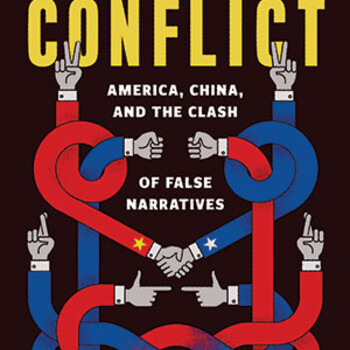Trade deficits are on the back of America, creating higher domestic costs
Roach told a dialogue held by the Center for China and Globalization on Friday that while China’s contribution to global economic growth is slowing, the country remains the most powerful engine in the world.
Tariffs of more than $350 Billion on Chinese imports ...Claims of Overcapacity are Over done.
We need all the capacity we can get!
Stephen Roach, Senior Fellow at Yale Law School and former Morgan Stanley Asia chairman
The misguided forces driving conflict escalation between America and China, and the path to a new relationship
“A timely, fluid, readable assessment of a testy and rapidly changing global relationship.”
— Kirkus Reviews (starred review)
In the short span of four years, America and China have entered a trade war, a tech war, and a new Cold War.
- This conflict between the world’s two most powerful nations wouldn’t have happened were it not for an unnecessary clash of false narratives.
- America falsely blames its trade and technology threats on China yet overlooks its shaky saving foundation.
- China falsely blames its growth challenges on America’s alleged containment of market-based socialism, ignoring its failed economic rebalancing.
Outlining the disastrous toll of conflict escalation between China and America, Roach offers a new road map to restoring a mutually advantageous relationship.
__________________________________________________________________
__________________________________________________________________
Consumption in focus
after ‘biased’ recovery
Analysts: Stronger supply side needs
efforts to expand domestic demand
By Ouyang Shijia
ouyangshijia@chinadaily.com.cn
China’s factory activity shrank
for the first time in three months
while the services sector expanded
at a faster pace in May, pointing to
a mixed picture amid uneven
recovery among sectors, analysts
said.
The latest economic indicators
point to an unbalanced recovery
with the supply side stronger than
the demand side, and the economy
still faces challenges from the moderation in private consumption
and the potential deceleration
across housing activity, they said.
Despite the pressures and difficulties ahead, the economic recovery will still be on track in the
following months, driven by a
ramp-up in fiscal stimulus, more
monetary easing and further
moves to tackle structural issues,
they said.
Their comments came as data
from the National Bureau of Statistics showed on Friday that China’s
official purchasing managers index
for the manufacturing sector stood
at 49.5 in May versus 50.4 in April,
below the 50-point mark that separates growth from contraction.
Zhou Maohua, a researcher at
China Everbright Bank, said the
manufacturing activity shrank
in May due to the impact of the
May Day holiday, while China’s
nonmanufacturing activity
remained in the expansionary
territory amid improvement in
the services sector.
- China’s services PMI grew to 50.5 in May from 50.3 in April.
- The country’s official composite PMI, which includes both manufacturing and nonmanufacturing activities, dropped from 51.7 in April to 51 in May, the NBS said.
“More efforts should be
made to spur consumption and
expand domestic demand. The
focus should be placed on speeding
up the implementation of key projects and better implementing the
announced property easing policies in accordance with various cities’ local conditions.”
Robin Xing, chief China economist at Morgan Stanley, said
China
has made incremental progress in
containing the risk of a debt-deflation loop, including a push for a
faster budget rollout and increasing efforts to support housing
inventory digestion.
- “We expect the augmented fiscal deficit to widen by 0.5 percentage point of GDP in both 2024 and 2025, though the focus may gradually shift from manufacturing upgrades this year to housing stabilization next year,” he said.
- “Meanwhile, there could be a 25- to 50-basis-point reserve requirement ratio cut in the next couple of months to facilitate government bond issuance, followed by a 20-basis-point policy rate cut in the second half of the year.”
Stephen Roach, senior research
scholar of the Paul Tsai China
Center at Yale Law School, said:
“China’s recent initiatives (to deal
with the property downturn) are
steps in the right direction.
- The property sector package has the right focus aimed at absorbing the inventory overhang of unsold housing units.”
- “It’s going in the right direction, but it needs far more funding support to really make a major dent in the overhang of unsold housing units.”
- “Without the Chinese consumer, I think economic growth is going to remain a big question mark in the years ahead.”
- He said it is advisable for the government to inject much more funding into the social safety net, healthcare and retirement.
- “I think that is the biggest impediment to discretionary consumption because it keeps families who are aging rapidly predisposed toward precautionary saving in providing for the future,” he said.




No comments:
Post a Comment